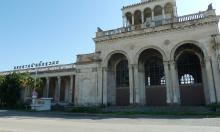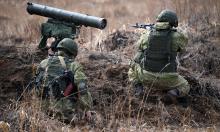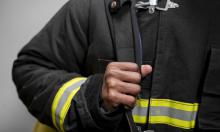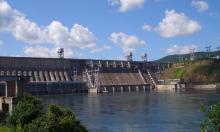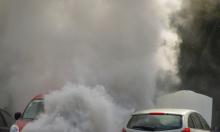Venezuelans reject Chavez's bid to win new powers
Venezuelans have rejected President Hugo Chavez's bid to win new powers and run for re-election for decades to come in an unprecedented defeat that could slow his socialist revolution in the OPEC nation.
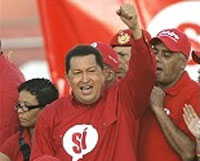
In a fiercely contested referendum on Sunday, voters said "No" to reforms that would have scrapped term limits on Chavez's rule, given him control over foreign currency reserves and boosted his powers to expropriate private property.
Election officials said early on Monday that the "No" camp had about 51 percent of the vote and the anti-U.S. president scored around 49 percent support.
Opposition celebrations immediately erupted throughout Caracas with caravans of activists cheering, honking horns and waving flags out of car windows.
Although he remains powerful and popular, it was Chavez's biggest vote blow since he swept to power in a 1998 election.
He quickly conceded defeat but insisted he would "continue in the battle to build socialism." He also said the reforms had failed "for now" and they were "still alive," suggesting he might try again to push them through later on.
Students, rights and business groups, opposition parties, the Roman Catholic Church, former political allies and even his usually loyal ex-wife all lined up against Chavez ahead of the referendum vote on Sunday.
They accused him of pushing the constitutional reforms to set up a dictatorship, Reuters reports.
While oil exports fueled annual economic growth of more than 8 percent over the past four years, the South American country has a credit rating below investment grade. Its annual inflation rate, 17.2 percent, is the highest in the region.
“The opposition will emerge from its vote more energized and empowered,” said Gianfranco Bertozzi, a senior Latin America economist for Lehman Brothers in New York. “If handled carefully the event could even herald a crumbling of the Bolivarian revolution, although it's still early.”
Four months after Chavez unveiled his plan to write a constitution that would quicken his so-called Bolivarian socialist revolution, some polls were showing the referendum too close to call. Opposition parties, student groups and even some former allies, most notably Chavez's ex-Defense Minister Raul Isaias Baduel, the general who returned him to power after a 2002 coup, campaigned against the proposal.
Their contention that the new constitution was a power grab resonated with some of Chavez's supporters.
“President Chavez has given us much, but this time he's gone over the top,” Darwin Rodriguez, 23, a glass blower, said in an interview in Caracas. “He wants more power. I don't know what to do, but for sure I won't vote `yes'.”
Demonstrations turned violent at times over the past three months as police regularly used tear gas and water cannons to control crowds of protesters.
Chavez sought to fire up his backers with escalating attacks on the U.S., foreign investors and the media in his final speeches before the vote.
He told tens of thousands of supporters at a Nov. 30 rally that he was prepared to cut off exports of oil to the U.S., Venezuela's biggest trading partner, should the U.S. government try to stir up violence in the country after the referendum. He also said he may nationalize Spanish banks operating in the country to defend the “dignity” of Venezuela, after Spanish King Juan Carlos I told him to “shut up” earlier this month.
Source: agencies
Subscribe to Pravda.Ru Telegram channel, Facebook, RSS!
